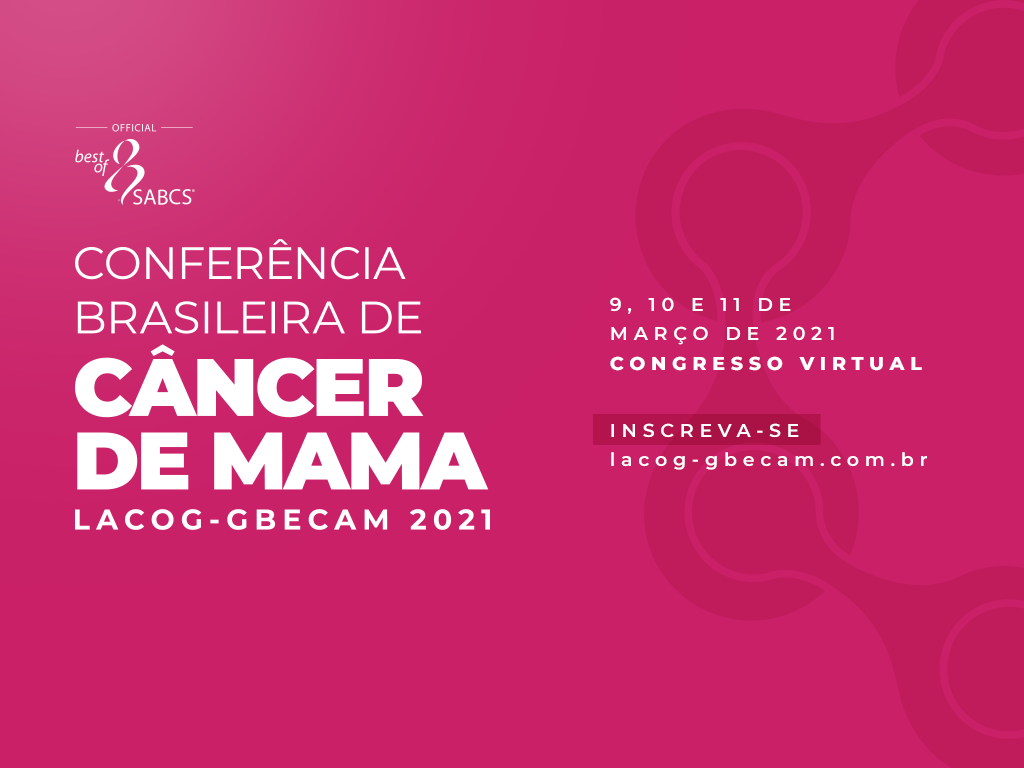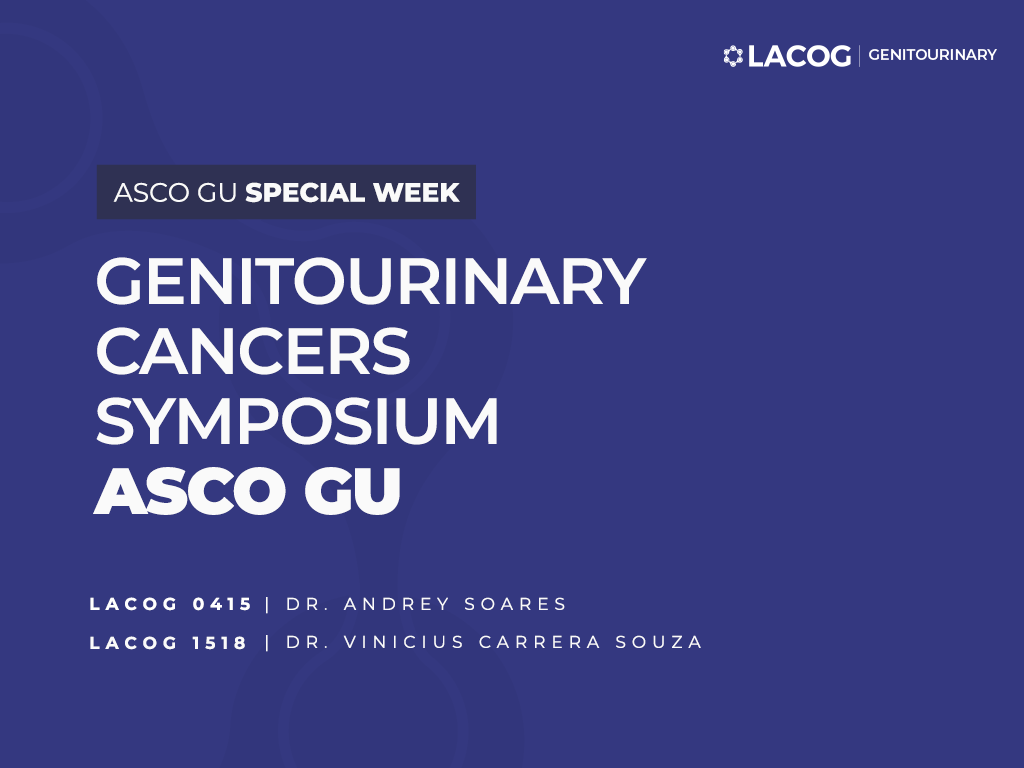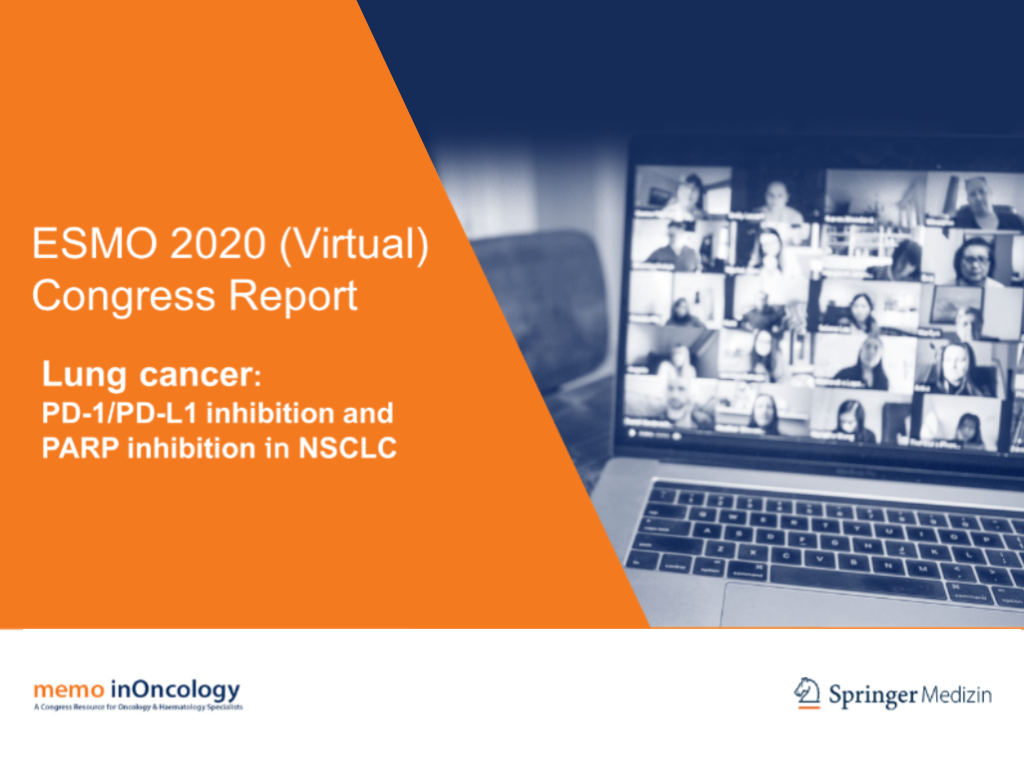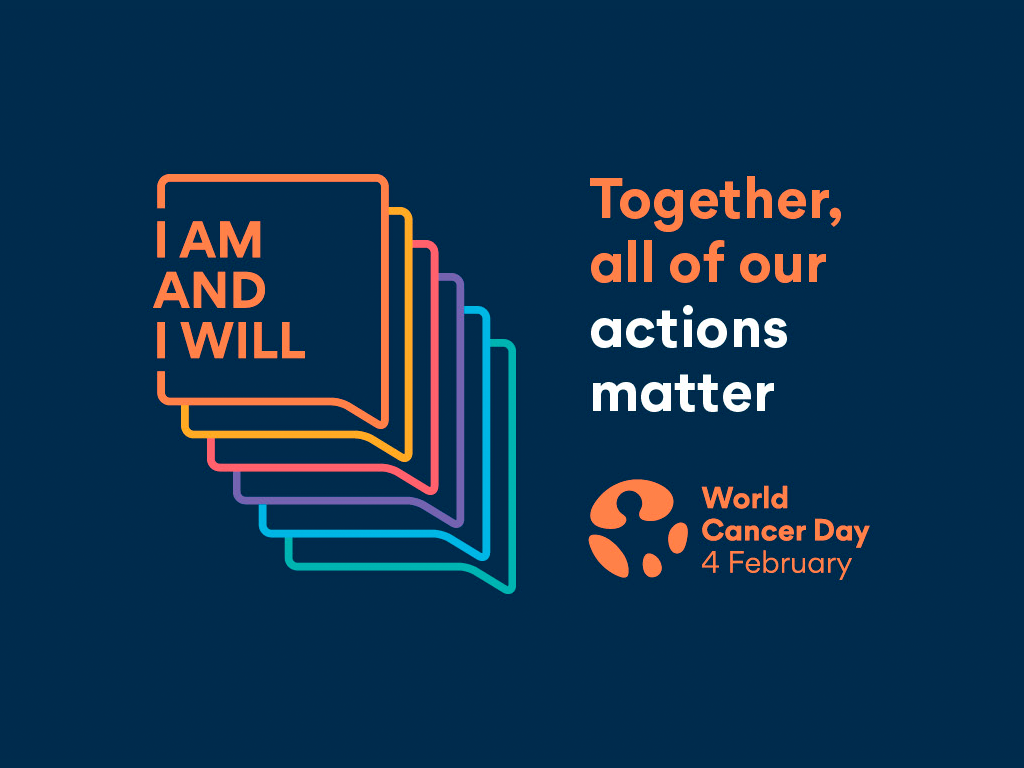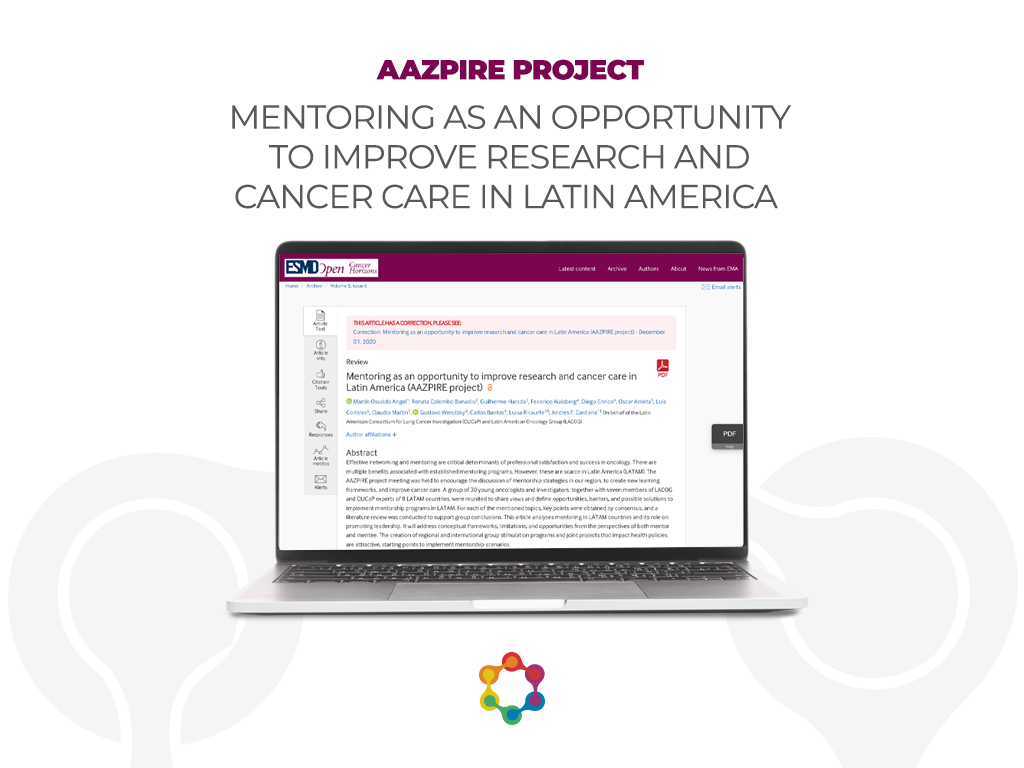Conferência Brasileira de Câncer de Mama 2021 – LACOG/GBECAM e Best of SABCS® Brazil
Evento em formato virtual contará com palestrantes nacionais e internacionais em sua programação para discutir os principais avanços no diagnóstico e tratamento do câncer de mama. Entre os dias 9 e 11 de março de 2021, se realizará a Conferência Brasileira de Câncer de Mama 2021, e o evento oficial licenciado Best of SABCS Brazil. Este evento é organizado pelo Latin American Cooperative Oncology Group (LACOG) e Grupo Brasileiro de Estudos em Câncer de Mama (GBECAM), instituições brasileiras dedicadas à educação e pesquisa em câncer de mama. O evento deste ano será em formato virtual e reunirá especialistas nacionais e internacionais para debater os principais avanços no diagnóstico e tratamento do câncer de mama. O primeiro dia do evento será dedicado ao Best of SABCS Brazil, no qual os participantes poderão acompanhar o que foi destaque no San Antonio Breast Cancer Symposium – realizado em dezembro de 2020, nos Estados Unidos. O SABCS é um dos mais relevantes congressos mundiais que debate pesquisa básica, translacional e clínica em câncer de mama. Os principais temas abordados no encontro serão agora apresentados e discutidos com exclusividade no Brasil. Nos outros dias do evento teremos módulos dedicados ao tratamento de doença inicial e metastática apresentando
LACOG investigators presented two studies at the Genitourinary Cancers Symposium
The Genitourinary Cancers Symposium, an event organized by the ASCO focused on presenting and debating the latest research, diagnoses and treatment for genitourinary cancer, took place between February 11 and 13 in an online format. LACOG participated by presenting two studies: Bladder Cancer Registry (LACOG 1518) and the APA in Prostate Cancer (LACOG 0415). The first study, presented by Dr. Vinícius Carrera Souza, an oncologists at Instituto D’Or – Bahia, as well as an investigator and executive director for LACOG Genitourinary Group, is centered around creating a multicentric Latin American database to analyze epidemiological, clinical and pathological data; treatment; results and biological information on patients diagnosed with recurrent/metastatic transitional cell carcinoma. The second study, presented by Dr. Andrey Soares, a clinical oncologist at Hospital Israelita Albert Einstein and Centro Paulista de Oncologia and scientific director of LACOG Genitourinary Group, is being conducted with Brazilian patients and assessed several therapeutic options that present fewer adverse events and consequently gains in life quality for individuals under treatment for prostate cancer. For more information and to enroll, visit: https://meetings.asco.org/gu/attend
Memo inOncology SPECIAL ISSUE congress report ESMO 2020 is now available!
This report highlights immune checkpoint inhibition with respect to chemotherapy-free regimens and new PD-1 inhibitors. Moreover, different types of therapy for early-stage lung cancer and determinants of treatment success in small-cell lung cancer are covered. Furthermore, innovative and established approaches for patients with uncommon mutations as well as EGFR-targeted options, possibly changing the treatment landscape, are addressed. Last but not least, this special issue includes expert interviews regarding the interactions between radiotherapy and the immune system and the implementation of immunotherapy-based standards for malignant mesothelioma. Additionally, on the memo website you will find expert video interviews with Paul Baas, Tony Mok, Maarten Lambrecht and Byoung Chul Cho on different conference highlights. The memo inOncology Special Issue report is produced by Springer, as a supplement of memo (the Magazine of European Medical Oncology) and sponsored by Boehringer Ingelheim and BeiGene with an unrestricted educational grant. For more information on the memo inOncology Special Issue series, and for free access to all previous editions, visit the memo-inOncology website. Download the ASCO 2020 Lung Cancer report
Abstract PS7-89: The socioeconomic impact of breast cancer in Brazil: An analysis of AMAZONA III cohort study
Tomas Reinert, Susana Ramalho, Vivian CA Vasconcelos, Leonardo R Silva, Ana Elisa R Silva, Camila A Andrade, Maria Beatriz PL Kraft, Guilherme P Coelho, Jovana Mandelli, Monique Binotto, Cesar Cabello, Geisilene RP Silva, Jose Bines, Carlos H Barrios, Matthew J Ellis and Marcia S Graudenz.
Abstract OT-10-01: A study to observe patients characteristics, treatment patterns and outcomes in patients with newly diagnosed breast cancer in Latin America – LATINA breast (LACOG 0615/ MO39485)
Tomas Reinert, Susana Ramalho, Vivian CA Vasconcelos, Leonardo R Silva, Ana Elisa R Silva, Camila A Andrade, Maria Beatriz PL Kraft, Guilherme P Coelho, Jovana Mandelli, Monique Binotto, Cesar Cabello, Geisilene RP Silva, Jose Bines, Carlos H Barrios, Matthew J Ellis and Marcia S Graudenz.
Abstract PS7-91: Influence of physician’s lifestyle on the prescription of healthy habits to breast cancer patients (LACOG 1218)
Tomas Reinert, Susana Ramalho, Vivian CA Vasconcelos, Leonardo R Silva, Ana Elisa R Silva, Camila A Andrade, Maria Beatriz PL Kraft, Guilherme P Coelho, Jovana Mandelli, Monique Binotto, Cesar Cabello, Geisilene RP Silva, Jose Bines, Carlos H Barrios, Matthew J Ellis and Marcia S Graudenz.
Adaptations and innovations in cancer care through COVID-19 and beyond
World Cancer Day World Cancer Day takes place every year on 4th February and is the uniting global initiative under which the world comes together to raise the profile of cancer in a positive and inspiring way. Spearheaded by the Union for International Cancer Control (UICC), the day aims to save millions of preventable deaths each year by raising awareness and improving education about the disease while calling for action from governments and individuals across the world. World Cancer Day 2021 is led by the theme “I Am and I Will”, an empowering call for personal commitment that represents the power of our actions taken now to reduce the growing impact of cancer. Adaptations and innovations in cancer care through COVID-19 and beyond On World Cancer Day, LACOG shines a light on the heroic responses to the pandemic by the local cancer community struggling to maintain progress in cancer care. Marking World Cancer Day on 4th February, LACOG give voice and says thank you to the nurses, doctors, researchers, volunteers, advocates and other caregivers in oncology from around the country, as well as government agencies, who have worked these past 12 months through the COVID-19 pandemic. Led by the Union for International Cancer Control (UICC), the
Study assesses cancer care mentoring programs in Latin America
A group of investigators from LACOG and CLICaP, together with 30 young oncologists from eight Latin American countries, undertook a study called “Mentoring as an opportunity to improve research and cancer care in Latin America” (AAZPIRE Project) with the aim of assessing mentoring programs in countries in Latin America, along with obstacles and limitations to implementation. The paper was published in December, in the British Medical Journal (BMJ). “Mentoring programs in our countries are limited and we depend on those conducted in major oncology associations, with completely different social and economic realities. This highlights the importance of creating mentorship programs in our region”, explains Dr. Martín Angel, a clinical oncologist at the Alexander Fleming Institute, in Argentina, and a LACOG investigator. He further underscored: “one of the leading benefits of mentoring programs in clinical research in Latin America will be through deeper insight into regional epidemiology, steering our health policies and ensuring better care for patients based on the prevalent pathologies.”
LACOG and the GOG Foundation partnership on the treatment of Gynecological Cancer
The Gynecologic Oncology Group (GOG) Foundation is an organization based in Columbia, in the United States, which works to promote clinical research in prevention and treatment of gynecologic cancers, such as ovarian, cervical , endometrial, vulvar, and vaginal cancers. The foundation has a network of over 400 members and has already given support on the conduction of 350 clinical trials, reaching over 115,000 patients. Institutions and investigators that belong to the GOG Foundation network are extremely important for the development of treatments and surgical procedures, for the quality of life analyses and prevention knowledge. The institution has support from industry and the National Cancer Institute (NCI) to conduct trials and generate results that are shared with participating members, health professionals, patients, and their families. The GOG Foundation is focused on the advances in Oncology to benefit cancer patients. LACOG has been working in partnership with the GOG Foundation, joining forces to support clinical studies. The aim of this partnership is to extend international cooperation to provide LACOG investigators the opportunity to participate in studies conducted worldwide. Likewise, this partnership allows LACOG to expand its portfolio of clinical trials, which extends the opportunity for Latin-American patients to participate in clinical research with the most



